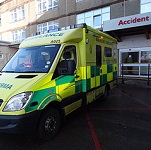 On 15 May the College of Emergency Medicine published a comprehensive report into the state of emergency care systems in the UK and highlighted its view of the way forward.
On 15 May the College of Emergency Medicine published a comprehensive report into the state of emergency care systems in the UK and highlighted its view of the way forward.
In the report – The drive for quality – how to achieve safe, sustainable care in our emergency departments – experts in emergency medicine at the college have called for fundamental changes in the way we design, fund and run our emergency care systems. Ten recommendations are made across four domains that the college believes must be considered and adopted by national policy makers, commissioners, clinicians and trust boards in order to return systems to stability and deliver the quality of care patients expect when they seek help in an emergency.
The college states: “Emergency care systems…are facing their biggest challenge in well over a decade as they aim to cope with unsustainable workloads and a lack of sufficient numbers of middle-grade doctors and consultants in emergency medicine to deliver consistent quality care. Both the Care Quality Commission and NHS England have recognised the scale of the crisis and the need for urgent action.”
The report is based upon the results of a survey of 131 EDs between 2011 and 2012 and recommends urgent action in a number of key areas. They are:
• System redesign to manage workloads and decongest the ED
• Expansion and sustainable working practices for staff
• A radical change to the way in which emergency care is funded
• A better system to measure the success of improvement rather than the four-hour system alone.
The statement from the CEM continued: “Importantly, the medical workforce challenges facing EDs at present will only be properly addressed by creating safe and sustainable working patterns that meet appropriate standards, allow good training environments to prosper and are attractive to the trainees of the future.”
Its vice-president Taj Hassan commented: “This report brings together for the first time hard data of the way in which we run our emergency care systems, how we record activity and fund them and, most importantly, how we care for our consultants and middle-grade doctors in the way we ask them to work. It is also clear that working environments for them at times are intolerable, associated with risk for them and their patients, and that action is required to stabilise our systems. The report has come at a timely juncture where our regulatory bodies and policy makers have also recognised this to be a crisis and suggested urgent action is merited.
“Our recommendations are based upon the need for close collaboration, system redesign, appropriate funding and sustainable working practices for care delivery and training. We will also be developing toolkits based upon the recommendations to help guide stakeholders to enact the recommendations to meet local and national needs.”
The publication of the report follows an announcement by NHS England of a support plan for emergency departments, which includes the freeing up of extra funding.
The plan also involves the setting up of urgent care boards covering all emergency departments. The boards have been tasked with ensuring that local recovery and improvement plans are in place for each A&E on their patch by the end of May.
Professor Keith Willett, who is NHS England’s National Director for Acute Episodes of Care and a trauma surgeon, said: “When pressure builds across the health and social care system, the symptoms are usually found in the A&E department.
“I’ve lived in that environment for 30 years and I know just how tough it can be. What we all want is great service for patients that meets and often exceeds the minimum standards. To get there, we need the whole NHS system, in the community and hospitals, to recognise the problems and help to relieve the pressure on their colleagues in A&E.
“In the longer term we need to combine all the expertise in the NHS to determine how best to organise emergency care in future so that people get appropriate, effective and rapid care whenever and wherever it is needed.”